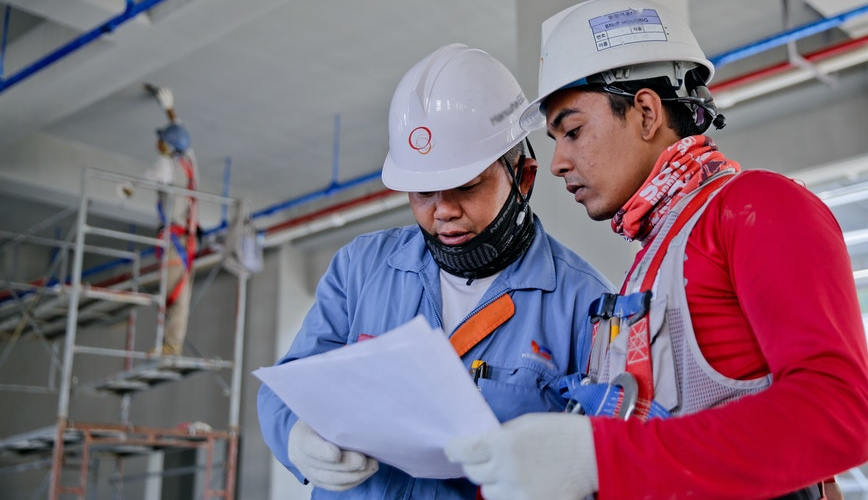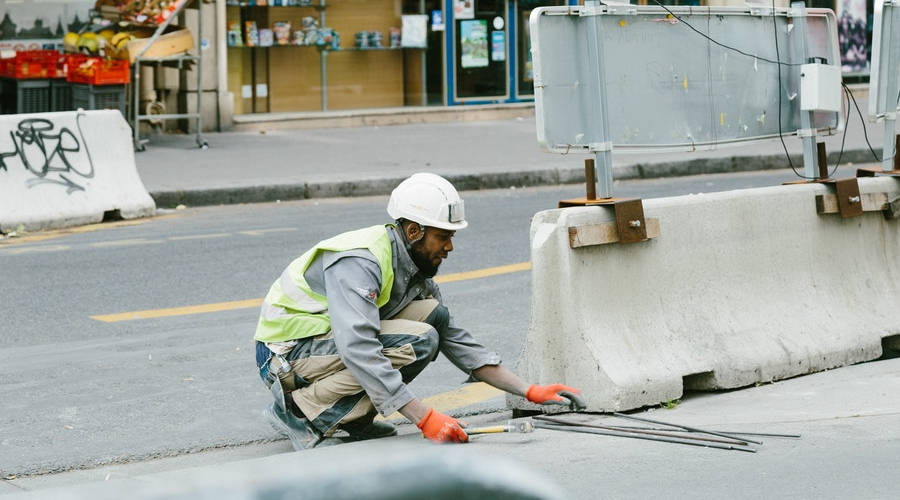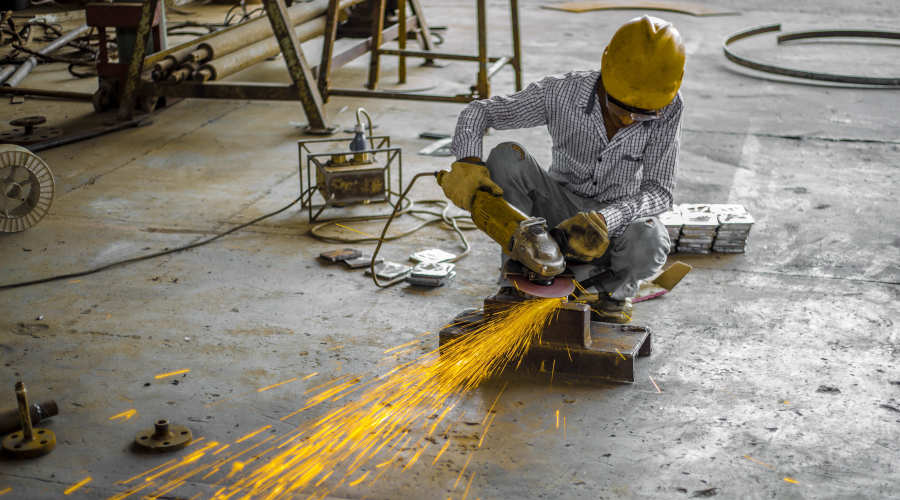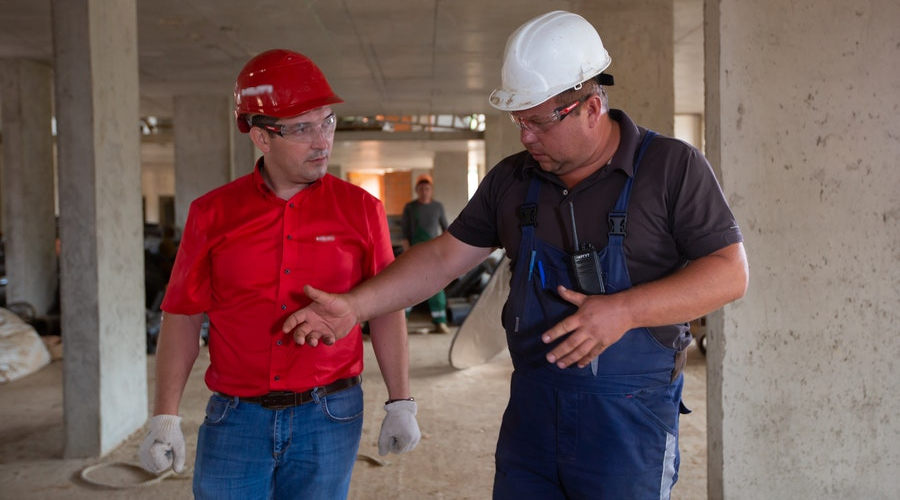Every job site has its risks and challenges, and effective communication is the best means to cope with all these challenges. All over the world, the construction industry engages millions of people every year and about 25% of these are immigrant workers. That means that language barriers in construction can be a major challenge.
According to the findings published by the American Council on the Teaching of Foreign Languages in 2019, the construction industry has the greatest foreign language skills gap. More than 40% of the workers reported a language skills gap whereas nearly 54% of them predicted that it will be a greater challenge in the future.

Language barriers in construction can lead to delays, losses, inefficiencies, injuries, or death. Therefore overcoming these language gaps should be a priority for the industry.
One reason for the gap may be that many think construction laborers only need to understand the basics of mundane tasks like building a wall or lifting heavy weights. However, in fact—regardless of whether the work is roofing, paving, commercial construction, or home improvement—there are numerous specialized skills required and dangerous hazards involved.
There may be complex machines that require in person training or written instructions. There may also be the need for safety training to avoid accidents.
With the steady increase of cultural diversity in the workforce, there is a growing need to fill in these communication gaps. Given the nature of this kind of labor, miscommunications or failure to understand the instructions given by the site manager may result in injuries, financial losses, and even death.
Need Translations About Construction?
Check out our construction industry translation services:
Construction Translation Services
The Risks Associated With Foreign Language Skills Gaps
Here are some of the challenges posed by the language barriers in the construction industry.
Decline in Productivity
Most construction managers divide the worksites into sub-sections and delegate the work to their assistants. When the instructions are passed on to the non-English speaking workforce, it takes a lot more time to comprehend the meanings.
Non-English speakers rely on the translations or interpretation provided by the people who know English and their native language. The daily activities may take longer to complete and result in a decline in productivity.
Several incidents have been reported in major construction sites in which workers did exactly the opposite of what they were told to do, and it seriously affected the deadlines.
Something to consider
For someone that is just learning English,
- “I DON’T want you to break down that wall,”
sounds a lot like,
- “I DO want you to break down that wall!”
And,
- “14 inches,”
sounds a LOT like,
- “40 inches.”
Inefficiency on the Worksite
Language barriers create stress among the workers. When they are unable to follow the instructions, they turn to others for help or start doing the work as per their own understanding. Building renovations demand a high level of efficiency as all of the projects are time-bound, and some crews can’t get started until other crews have finished.
If the workers are unable to put forth their best efforts due to a lack of confidence, the projects suffer greatly. In the United States where there’s a strong contingent of Latino construction workers, oftentimes these communication gaps can be resolved when some of the crew has a strong grasp of both English and Spanish and are able to guide those who still struggle to understand their English-only colleagues or managers.

The success of construction projects depends on clear communication.
Major Safety Hazard
The biggest threat posed by language barriers is safety. Construction managers are continuously assessing the job sites and directing workers on how to avoid the risks and threats. But if there’s a language gap, life-saving health and safety messages in the English language do not reach some of the relevant people.
This communication gap not only puts those workers at risk but also others working nearby. An increased number of onsite accidents puts additional pressure on the budget and affects the reputation of the construction company as well. But all that pales in comparison to the thought of any one of your workers not being able to go home to his or her family at night due to an avoidable accident.

Construction can be done safely, but if safeguards and guidelines are not used and followed, it can be extremely dangerous. Clear multilingual safety training can be a key component in keeping the jobsite safe.
Lack of Unity in Workforce
Where there is cultural diversification and a lack of effective communication, it’s hard to bring unity to the workforce. Although most construction managers do not like to think about the possibility, these gaps can also lead to serious hate crimes and harassment.
The companies are looking forward to reducing these gaps as they fear facing the liabilities associated with on-site crimes. These differences sometimes lead to discrimination among different groups that seriously impedes work efficiencies.
Like the Article?
Click here to share on Twitter>>
Tweet
Click here to follow IVANNOVATION on Twitter and be first to learn about our new content>> Follow @ivannovation
Construction Risks and Errors
As language barriers impact the employee’s orientations and their skills assessments, there are major gaps in subsequent training. All of these factors increase the uncertainty of project rules and policies that translates into construction risks and errors. These errors may become evident in the long run and if the liabilities are linked to the miscommunication of the workforce, the companies face major losses. Construction errors put everyone at risk and cost money, time, and lives.
How to Mitigate the Language Barrier Gaps?
Although language barrier gaps affect the safety of the worksite, a practice such as refusing non-native speakers is discouraged. Such a practice could be considered racial discrimination and lead to its own risks and damages. Plus, oftentimes the most skilled workers in your area in any given trade may just be native speakers of another language.
Because the construction language gap problem won’t just go away, it’s important to find ways to mitigate the problem.

Unlike an ugly wall, you can’t just paint over the language gaps in your construction company. You must make hiring decisions and investments to overcome those gaps.
Determine the Present and Future Language Needs
The first step should be to assess the current situation in the company. The linguistic strengths and weaknesses of the company should be identified. Experts can help project the future needs of the company and devise plans accordingly.
Hire Multilingual Workforce
Another effective approach is to keep a strategic focus on the foreign language skills of the workers during the recruitment process. Look to hire employees that offer multilingual and cross-cultural competencies that you can rely on.
Get in touch with training institutes and colleges that have foreign language and study abroad programs. This provides you access to fresh graduates that are proficient in more than one language. The qualified graduates when hired as construction managers can be very effective in fulfilling the language barrier gaps.

One key way that construction companies overcome the language gap is by hiring lots of multilingual talent.
Get Materials Translated
Hiring bilingual employees is an important step, but construction companies should also have plenty of written materials translated.
Sometimes bilingual employees can help translate, but not every bilingual employee is necessarily a linguist, meaning that their translations may not always be professional, accurate, or clear. What’s more, when you ask your bilingual employees to sit down and translate documents, you are calling them away from their main jobs that you hired them for.
That’s why construction companies often have materials such as safety training, employee handbooks, construction plans, and other documents translated by professional construction industry translators.
Offer Immersive Language Training Programs for Your Workforce
A construction company can significantly reduce the language barrier breaches by offering immersive language training programs for the workers. All of the workers who lack the suggested proficiency of the required language can enroll in the programs. It can take a chunk of your budget, but every construction company that is committed to providing their employees with a work environment “free of recognized hazards” must do it.
Taking these steps will make your company more welcoming for people coming from different countries. Crossing these communication gaps can give you access to unrecognized and underutilized talents of a diverse workforce without any compromises on their safety.
Richard White is passionate about writing facts that people don’t know. With more than 10 years of business and writing experience. Richard White has found a formula for success in his life by working at CityLocal 101. “Success is doing the quality work you want.” Richard is fond of music, fishing, and walking on the beach.




very informational and beneficial blog for me, thanks for sharing
Insightful. Thank you.